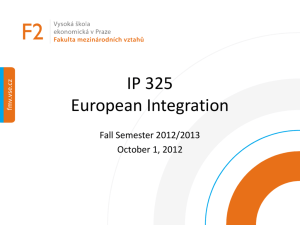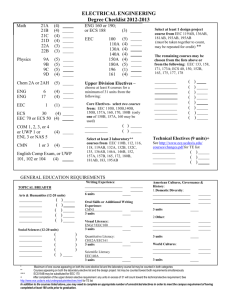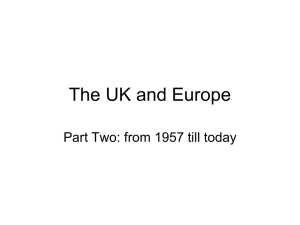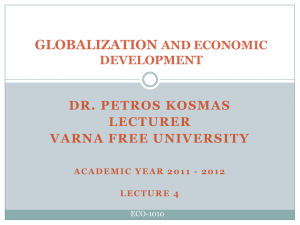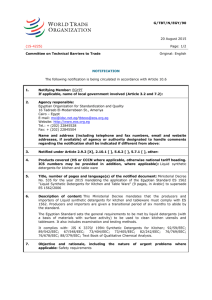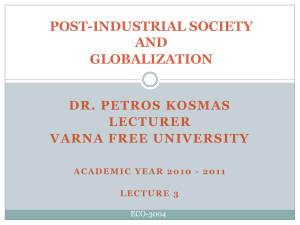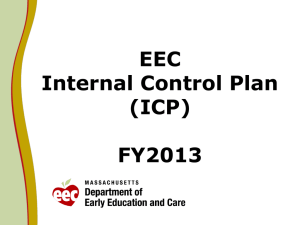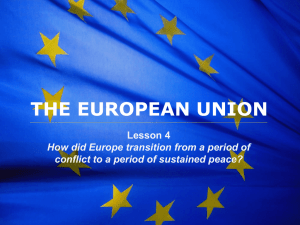The UK`s relationship with the EU
advertisement
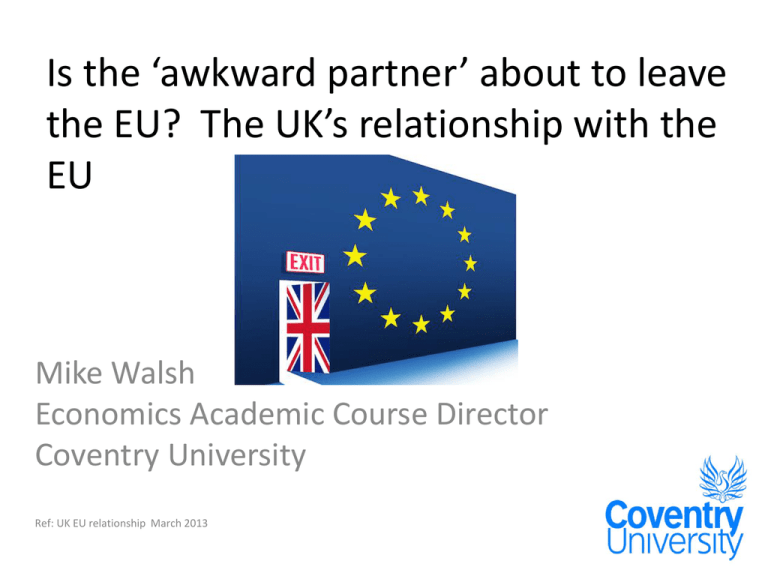
Is the ‘awkward partner’ about to leave the EU? The UK’s relationship with the EU Mike Walsh Economics Academic Course Director Coventry University Ref: UK EU relationship March 2013 (1) Introduction • The UK joined the EEC (EU from 1993) in 1973 • Late: over 20 years after the EEC was formed! • Within a year the UK had built up a reputation for being the ‘awkward partner’ ( George S, 1998) – opposed many EEC initiatives – took an independent view – was disruptive • We will consider why the UK was considered to be the ‘awkward partner’ and why EU exit is on the agenda UK attitudes • These help explain the UK’s relationship with the EU. Generally, the UK : – Is pragmatic – Believes in free markets – Doesn’t want to give up sovereignty – Wants widening of EU – Wants less integration. No federalism • Relevant today – Gordon BROWN (PM) signing Lisbon Treaty 2007 – EU splits some UK political parties (2) UK and Europe: The early years 1945-57: Preparation • Positions of countries – UK • 3 circles Empire USA Europe • UK condescending? • intergovernmental approach ok – France • wanted decline in German industrial power – Germany • wanted acceptance European Coal & Steel Community (ECSC) • Schuman Plan (9th May1950) – Monnet’s ideas • sectoral approach – Iron & steel major sector – France - Germany • ECSC – Treaty of Paris 1951 - est. 1952 – 6 members – Supranational from beginning • UK not want to give up sovereignty ECSC to EEC • Messina (1955) – Extend Benelux model (Spaak) – Atomic energy cooperation (Monnet) – UK position: don’t get involved • Treaty of Rome 1957 (effective 1958) – EEC Treaty – Euratom Treaty • UK: don’t get involved EEC Take off and early progress (1958-72) • EEC economic success • EFTA (1960) – EEC Rival – Included UK • France vetoes UK entry to EEC • Finally, success – Hague Summit 1969 – Agreement for UK to join the EEC – UK joined 1/1/73 (3) UK & The EU Budget • A major issue for 40 years Budget 2013 Cohesion CAP Rural development Competitiveness Admin Security & justice External Relations • 1st EU enlargement 1973 • UK rebate: major issue • UK disruptive – Veto in Council Of Ministers (pre SEA 1986) • UK major contributor but one of poorest states in 1970’s – Reasons • CAP • Common external tariff (CET) – Conflicts High CAP expenditure (% budget share) when UK joined EEC in 1973 • Fontainebleu Summit 1984 • UK rebate • UK rebate issue resurfaced 1998 onwards • 2005: Blair wanted CAP reform in return for UK giving up budget rebate • UK & France fall out! • Outcome: UK gives up some of rebate – With conditions • Budget issues still exist today – David Cameron (UK PM) in EU budget talks – 2011: Opposed large increase in EU budget • http://www.bbc.co.uk/news/world-europe-11652601 • 2012/13: Opposes real increase in EU budget for 2014-20 Financial Perspective • Budget rebate AGAIN (4) Economic and Monetary Union (EMU) • Monetary union ‘’launched’' 1979 – European Monetary System EMS • EMS - 2 components – European currency unit (Ecu) – Exchange rate mechanism (ERM) • • • • • 8/9 countries NOT UK UK eventually joined 1990 BUT, UK exit 1992 September 1992 ‘ERM crisis’ • http://news.bbc.co.uk/player/nol/newsid_6560000/newsid_6563000/6563031.stm?bw=bb&mp=wm&news=1&bbcws=1 • Maastricht Treaty 1991 – UK & Denmark opt out of Euro – Only countries to do so • UK set 5 economic tests for joining – Failed 4 out of 5 (2003) – Political device, not economic (5) Social Policy • UK generally believe in free markets, laissez faire – ‘Anglo Saxon’ approach – European interference in labour market – Social Policy raises costs for firms & makes them uncompetitive – E.g. Working Time Directive • Approaches by selected countries below – UK, Ireland – free market – Germany, Benelux countries– collective bargaining provides worker protection – France, Spain, Portugal, Greece- statutory framework to protect workers rights as weak collective bargaining • Social Charter 1989 – Social policy expanded – not legally binding – opt out by… • Maastricht Treaty – Binding on EU States – Opt out by…… Answer these questions relating to Spain • Is it easy for a firm to make a worker redundant? • How much social tax (%) does a firm pay on wages • How many days holiday does the average worker receive? • Do you think working more than 48 hours / week is ok? • If you lose your job what benefits can you receive? (6) What does the UK want from the EU? Free Trade • Access to the SINGLE MARKET • Very ‘Anglo Saxon’ • Single European Act (SEA) 1986 • All trade barriers to be eliminated • Aims include – Bigger markets for firms – Increase efficiency of firms – Aid integration – Benefit consumers • Generally regarded as successful (7) UK: Even more awkward? • Exit? David Cameron’s Europe Speech January 2013 • UK renegotiate with EU? – ‘cherry pick’ policies – Drop which policies? – UK want which policies? • Hold referendum to leave EU in 2018 if renegotiation fails • Why? Options if UK leave EU? • Renegotiate agreements with EU? – Like Switzerland – About 200 bilateral agreements • Join EEA? – Access to single market – Like Norway • Be like rest of world? • Scotland? UK in Europe (8) Conclusion • After 40 years membership Europe still divides UK opinion & splits political parties • UKIP is a new anti-EU party • UK is still the awkward partner References • S George, ‘An Awkward Partner: Britain in the European community’ • R Baldwin & C Wyplosz, ‘The Economics of European Integration’ • http://europa.eu/

